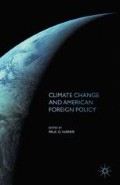Abstract
Climate change, sometimes labeled global warming or the enhanced “greenhouse effect,” is the extraordinary warming of the Earth from increased concentrations of “greenhouse gases” (GHGs) and the climatic consequences of that warming. Many of those consequences are likely to be harmful to humans and to the natural environment. Over the last decade, governments have negotiated international agreements to address climate change, most notably the 1992 Framework Convention on Climate Change (FCCC). American foreign policy has become intimately involved in the politics of climate change. This policy is explained by a myriad of factors, ranging from concerns for American national interests and the pluralism of American domestic politics, to the influence of ideas and international norms on foreign policymakers.
Access this chapter
Tax calculation will be finalised at checkout
Purchases are for personal use only
Preview
Unable to display preview. Download preview PDF.
Notes
Energy Information Administration, Emissions of Greenhouse Gases in the United States 1996 (Washington, DC: Energy Information Administration, 1997);
Energy Information Administration, Annual Energy Review 1996 (Washington, DC: Energy Information Administration, 1997).
For the definitive work up to 1996, see the IPCC’s second assessment report on the science of climate change: J. J. Houghton et al., eds., Climate Change 1995: The Science of Climate Change (New York: Cambridge University Press, 1996). The most recent report of global temperature, which confirms the warming trend, is National Research Council, Reconciling Observations of Global Temperature Change (Washington, DC : National Research Council, 2000), <http://www.nap.edu/books/0309068916/html/>.
Ibid. Impacts based on the IPCC scientific conclusions are described in R. T. Watson, M. C. Zinyowera, and R. H. Moss, eds., Climate Change 1995: Impacts, Adaptations and Mitigation of Climate Change: Scientific-Technical Analyses (New York: Cambridge University Press, 1996).
World Resources Institute, World Resources 1998–99: Environmental Change and Human Health (New York: Oxford University Press, 1998): 174–75.
This summary of impacts is distilled from R. T. Watson, M. C. Zinyowera, and R. H. Moss, eds., The Regional Impacts of Climate Change: An Assessment of Vulnerability, IPCC Working Group II Special Report (Cambridge: Cambridge University Press, 1998). The 1997 regional impact report is a metaanalysis of state-of-the art information. It is based on the IPCC’s 1995 second assessment report and subsequent peer-reviewed literature. The “assessment is necessarily qualitative” due to uncertainties and sometimes incompatible data sets and therefore its findings “are best interpreted as illustrative of the potential character and approximate magnitudes of impacts....” IPCC, “The Regional Impacts of Climate Change: An Assessment of Vulnerability,” Summary for Policymakers (November 1997), section 3, <http://www.usgcrp.gov/ipcc/html/RISPM.html>. Like the 1995 report, most results were based on a carbon dioxide doubling scenario and usually exclude aerosol effects. See also World Resources 1998–99.
A.J. Michael et al., eds., Climate Change and Human Health (Geneva: World Health Organization, 1996).
R. Gommes et al., Potential Impacts of Sea-Level Rise on Populations and Agriculture (Food and Agricultural Organization, 1998), <http://www.fao.org/WAICENT/FAOINFO/SUSTDEV/EIdirect/EIre0045.htm>.
For a more detailed discussion of the role of science in the context of climate change politics, see Sheila Jasenoff and Brian Wynne, “Science and Decisionmaking,” in Human Choice and Climate Change: The Societal Framework, edited by Steve Rayner and Elizabeth L. Malone (Columbus: Battelle Press, 1998): 1–87.
Ute Collier and Ragnar E. Lofstedt, “Think Globally, Act Locally? Local Climate Change and Energy Policies in Sweden and the UK,” Global Environmental Change 7, 1 (1997): 25–40.
Peter Hart, Democratic Party pollster, quoted in Walter A. Rosenbaum, Environmental Politics and Policy (Washington, DC: CQ Press, 1998): 334.
World Climate Conference, World Climate Conference: A Conference of Experts on Climate and Mankind—Declaration and Supporting Statements (Geneva: World Meteorological Association, 1979).
The call for a “framework” convention was based on the success of the framework Vienna Convention on ozone depletion that resulted in the 1987 Montreal Protocol on Substances that Deplete the Ozone Layer. See Richard E. Benedick, Ozone Diplomacy, enlarged edition (Cambridge, MA: Harvard University Press, 1998).
See the chapters that follow and Paul G. Harris, Understanding America’s Climate Change Policy: Realpolitik, Pluralism, and Ethical Norms (Oxford: Oxford Centre for the Environment, Ethics and Society, 1998).
Editor information
Editors and Affiliations
Copyright information
© 2000 Paul G. Harris
About this chapter
Cite this chapter
Harris, P.G. (2000). Climate Change and American Foreign Policy: An Introduction. In: Harris, P.G. (eds) Climate Change and American Foreign Policy. Palgrave Macmillan, New York. https://doi.org/10.1057/9781137120809_1
Download citation
DOI: https://doi.org/10.1057/9781137120809_1
Publisher Name: Palgrave Macmillan, New York
Print ISBN: 978-1-137-57253-0
Online ISBN: 978-1-137-12080-9
eBook Packages: Palgrave History CollectionHistory (R0)

